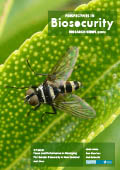 The New Zealand public, its industries and the conservation sector, are greatly concerned about the state of national biosecurity protection, awareness, and system performance – and rightly so. Scarcely a day goes by without a new story in the media about a biosecurity breach, a pest, a threat, or a related impact on the economy, biodiversity, human health, or lifestyles.
The New Zealand public, its industries and the conservation sector, are greatly concerned about the state of national biosecurity protection, awareness, and system performance – and rightly so. Scarcely a day goes by without a new story in the media about a biosecurity breach, a pest, a threat, or a related impact on the economy, biodiversity, human health, or lifestyles.
The vast majority of this public focus is on issues at the national border. Yet the greatest number and cost of biosecurity programmes in New Zealand, and the greatest impact on citizens’ wallets, are the many pest management programmes developed and implemented by regional and unitary councils. These programmes tend to be largely ignored by the national media, possibly because they are implemented by 17 disparate regional and unitary councils (hereafter referred to as councils), and possibly because most of the programmes are unspectacular, business-as-usual, necessary activities that help to keep farming profitable, the environment liveable and conservation achievable. There has also been, surprisingly, little wider scrutiny of the performance and scope of these regional bodies and their biosecurity programmes.
Click here to read the opinion piece
Craw, J. (2015). Opinion: Focus and performance in managing post-border biosecurity in New Zealand. Unitec ePress Perspectives in Biosecurity Research Series (3).
https://doi.org/10.34074/pibs.rs32015
About this series:
Perspectives in Biosecurity is an occasional, multi-disciplinary electronic series of research papers and other outputs covering all aspects of the field of biosecurity, including, but not restricted to: invasion biology and ecology, invasive species identification/diagnostics, management and eradication/control, new invasive species records, modelling, biosecurity law and policy, relationships between human society and invasive species. Papers in Perspectives in Biosecurity are primarily the results of research carried out by staff, students, graduates, associates, and collaborators of Unitec Institute of Technology. All papers are subject to a double blind peer review process. For more papers in this series please visit:
www.unitec.ac.nz/epress/index.php/category/publications/epress-series/perspectives-in-biosecurity/
Leave a Reply